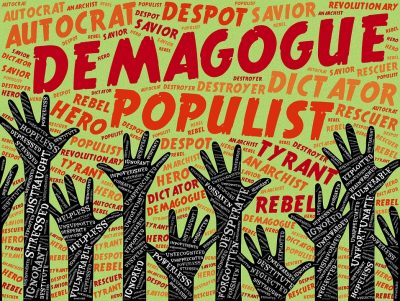The Age of Disputed Presidencies – Is Democracy in Crisis?

In 1378, it was not clear who the true Pope was. Depending on whom one asked, it was either Clement VII, nowadays listed as an Antipope in the Catholic Encyclopedia, or Urban VI. This was a time of crisis in Western Europe, often referred to as the “Western Schism”.
Likewise today, in the realm of secular politics, we currently have or recently had disputed or contested presidencies – in varying degrees – in many countries. In fact, Venezuela – where Guaidó and the country’s president Maduro are each recognized by a number of countries – is far from the being the only such case in Latin America.
For instance, in Peru, on October 2019, both Vizcarra and Araós claimed to be the legitimate president. In Honduras, Hernández election was contested, amid allegations of narco connections. Even in Colombia, Petro (2018 election runner up) and his party no longer recognize Duque’s presidency, who has also been accused of narco links and of tampering with ballots. In Brazil, Ms. Roussef’s 2016 deposition was perceived by many as an “institutional coup”. The current Brazilian president Bolsonaro, in his turn, also faces accusations of vote fraud through the use of Whatsapp “fake news”.
There are disputed presidencies or leaderships right now in Belarus, Guinea-Bissau, Malawi, Mali (which is under a military coup) and other countries. In the US, Trump’s 2016 election was also hotly contested (there were even wild accusations of “Russian interference”) and many journalists and experts are now writing that the new US election – amid the coronavirus outbreak and other crisis – may not be “swiftly accepted”. Antifa demonstrations are spreading across the country and are becoming increasingly violent.
All such legitimacy disputes are not just narrative wars amongst political rivals – it rather seems that in many parts of the world, the election process itself and democracy are losing credibility. It could turn into a war of models. If the contemporary and rather globalized democratic model is in crisis – and it would appear so – then, what are the alternatives?
The very specific notion of “Democracy” as necessarily including free speech, a multi-party system, alternance in power, a secular state and a Montesquieu’s trias politica separation of powers – with an often bicameral legislature – is of course quite Western in terms of its history and the values underlying it. In Western discourse today, the notion of democracy sometimes gets even more exclusive, sometimes including only societies which recognize gay marriage and do not criminalize abortion.
The United States is often taken as an (unexamined) “standard-bearer” for the entire world. The truth is that political forms and models are not so clearly differentiable but actually are rather intermingled. Thus, the current British monarch, for example, is officially the Defender of the Church of English and, as such, appoints Bishops and Archbishops – and no one dares to call it a “theocracy”. The US president, in his turn, in his authority to conduct war, has the power to maintain anyone under indefinite detention (without due process of law) according to attorney John Yoo (of so called Torture Memos) – and no one calls it a dictatorship. Clearly, labeling one as “non-democratic” is also a weapon of political discourse.
As for alternative models, a few years ago, notions of “Bolivarian” direct democracy were on the rise in South America. Furthermore, Bolivia’s 2010 law acknowledged the rights of Pachamama (Mother Earth) as a collective subject of public interest. The current Bolivian de facto president, Ms. Jeanine Áñez (President Morales was deposed in what many described as a coup), is currently working to undermine such notions as well as the notion of Bolivia as a Plurinational State – as defined by its 2009 Constitution.
So, right now, the left too (and its Bolivarian and indigenist alternatives) has been largely discredited amongst a large part of the population in South America. This has opened the door for the rise of a new kind of right-wing “populism” – which has little regard for current institutions. For instance, according to recent polls, 34% of the Brazilian population would support closing down (abolishing) the Parliament and 32% support doing the same to the Supreme Court. The COVID-19 pandemic could also be paving the way for “authoritarianism” in Europe and the US, according to several political scientists. The new populism is on the rise in Europe too.
In many parts of the world, a large part of society seems to care more about employment and security than abstract notions of the rule of law. If current political regimes fail to provide safety and to economically include the people they rule, dissatisfaction is sure to follow. And in the economically fragile post-COVID-19 world, this could get ugly.
Is it about time to reinvent democracy? Some new forms of it could arise, better suited for their cultural and regional contexts. In the meanwhile, a lot of instability may ensue (with economic and security consequences), especially in Latin America but in other parts of the world too – perhaps in Europe and the US as well.
*
Note to readers: please click the share buttons above or below. Forward this article to your email lists. Crosspost on your blog site, internet forums. etc.
This article was originally published on InfoBrics.
Uriel Araujo is a researcher with a focus on international and ethnic conflicts.
Featured image is from InfoBrics

